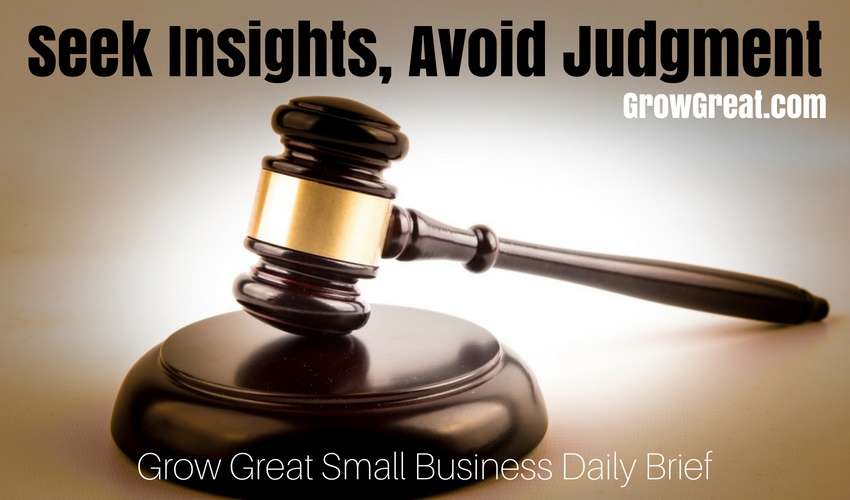Podcast: Play in new window | Download (Duration: 5:51 — 6.6MB)
Subscribe: Apple Podcasts | Spotify | RSS | More

It’s one of the hardest things to accomplish. To get insights without the judgment.
You’re surrounded by lots of people willing to tell you what you ought to do. Should-ing people is easy.
“You should do this. Or that. But not this other.”
It’s judgment. Second guessing. People who want to own telling you what to do, but they don’t have to own the outcome. They can sit safely from their judgment seat and make recommendation after recommendation. And quickly point out how you’re making a mistake by doing whatever it is you’re doing.
It’s a completely different thing – and a much more valuable thing – to surround yourself with somebody (or a group of somebodies) who can help you find the insights you may seek. Every small to medium sized business owner needs insights because they help us avoid our blind spots. They help us figure out our false assumptions. Or the ones that may be holding us back.
The other day I found myself on a car manufacturer’s website. You could select a model, then take a virtual tour of the interior. By holding your computer mouse, or finger over the photo visitors can move around to see different viewpoints of the interior. The dashboard looks different from the back seat than it does from the driver’s position.
Running your business without insights is like sitting in the back seat assuming it’s the only point of view. It’s limiting.
But so is judgment.
Consider the source.
Opinions aren’t hard to come by. Neither is judgment.
Because the people who surround you mostly have lots of both. It’s not that their viewpoint is bad. Or unhelpful. It just comes with strings attached. Strings you have to account for.
I’m sitting down with a CEO of a manufacturing company. He’s confiding in me a problem he’s wrestling with. We’re talking numbers. Financial numbers. It’s the potential impact and opportunity of this problem. Since it involves numbers I think it only natural to ask, “What does your CFO say?” Without blinking he tells me he’s not talked with his CFO yet. It’s evident he’s not wanting to do that just yet.
Why?
Because his CFO isn’t the most opportunistic leader. Mostly, he’s risk-averse. The CEO know the CFO will only see the downside and not the opportunity. There’s his string. Thankfully, the CEO sees the string. The bad news is, the CEO has no trusted internal advisor about such things. Do you think that’s a constraint for him and his leading the company? You bet.
Where are your constraints? What’s bottlenecking your insights?
People with an agenda. Aka, strings attached. Again, it doesn’t mean their insights aren’t useful. But it does mean their insights have a bias that’s likely favorable to them. You can’t blame them. This CFO has a viewpoint. Namely, that it’s his job to PROTECT and PRESERVE. He doesn’t really understand, or embrace the notion that he could also be a great gatekeeper seeking to help the CEO seize growth opportunities. That doesn’t make him a bad guy. It does make him biased toward how he sees his role though.
Surrounding yourself with people who expect nothing from you is key. They don’t need you as their boss. Or supplier. Or partner. Or customer. Or investor. And you don’t need them in any of those roles either.
You can find them. It may not happen organically or naturally. That is, you may not find them in the wild. In fact, I’ll be among the first perhaps to tell you — you won’t find them by happenstance. You’re going to have to be intentional and purposeful. It’s got to become a priority. And that’s your problem. It’s not.
You’re looking at the dashboard of the car from the default view thinking it’s the only one that matters. I’m pushing you to move the mouse around. Look at it from other angles. It’ll provide a clarity you’ll never see otherwise. It’s the difference in the business owners who expand, grow and improve.
Oh, and at the end of the day, you need to do what you think is best. It’s your show. Get the arm-chair quarterbacks out of your life. That scoreboard isn’t reflecting their performance, but yours. Own it.
Who you surround yourself with matters. Put in the work to make that group the most powerful group possible.
Be well. Do good. Grow great!

Subscribe to the podcast
 To subscribe, please use the links below:
To subscribe, please use the links below:
- Click Here to Subscribe via iTunes
- Click Here to Subscribe via RSS (non-iTunes feed)
- Click Here to Subscribe via Stitcher
If you have a chance, please leave me an honest rating and review on iTunes by clicking Review on iTunes. It’ll help the show rank better in iTunes.
Thank you!
 About the hosts: Randy Cantrell brings over 4 decades of experience as a business leader and organization builder. Lisa Norris brings almost 3 decades of experience in HR and all things "people." Their shared passion for leadership and developing high-performing cultures provoked them to focus the Grow Great podcast on city government leadership.
About the hosts: Randy Cantrell brings over 4 decades of experience as a business leader and organization builder. Lisa Norris brings almost 3 decades of experience in HR and all things "people." Their shared passion for leadership and developing high-performing cultures provoked them to focus the Grow Great podcast on city government leadership.
The work is about achieving unprecedented success through accelerated learning in helping leaders and executives "figure it out."